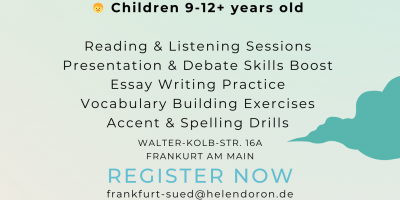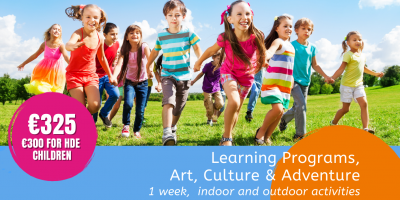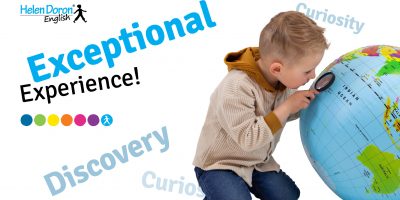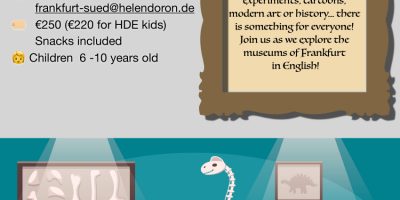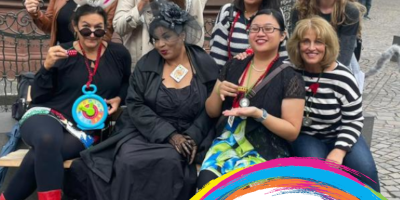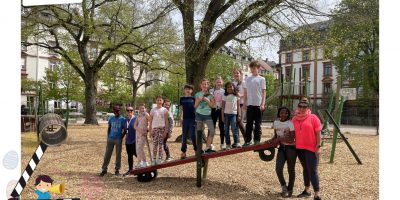At Helen Doron, learning English goes beyond traditional language education. We believe that education should not only stimulate intellectual growth, but also emotional and social growth. Join us in exploring the unique aspects of our students‘ ESL journey and experience an exceptional learning experience.
Come along on a journey of wonder and discovery! In this post, we explore how we can create a lively atmosphere of curiosity and exploration, essential ingredients for English language learning and personal growth. Our goal? To give each child an all-around educational adventure!
Curiosity: The Key to Effective English Learning in Children
Ah, the good old days when your child looked up at you and asked, „Do trees make the wind?“ or „How do birds zoom through the sky?“ That’s the curious spirit we adore – it’s like a secret weapon for learning, especially when it comes to mastering a new language. At Helen Doron English, we’re all about tapping into that wonder with our special teaching tricks, making English lessons not only effective but also a total blast!
Curiosity is like a pair of magic glasses for kids, making the world sparkle with wonder and delight. Suddenly, the mundane becomes a thrilling quest of exploration and discovery. This zest for adventure sets them up to be supercharged learners, ready to tackle any challenge!
A child’s innate sense of wonder can be a powerful force in their early learning experiences, particularly in language acquisition. By fostering a sense of curiosity, children can connect with their surroundings in a meaningful and enjoyable way, paving the way for increased comprehension and retention. As a child grows, their curiosity evolves, constantly shaping their perception of the world.
Curious Minds Seek Informative Teachers
Did you know that even in their early stages of development, children are surprisingly adept at selecting their sources of learning? Recent research indicates that infants seek out adults who can provide them with the information they crave, suggesting that they are active learners rather than passive recipients of knowledge. As a parent, you can seize every opportunity to expand your child’s horizons, starting with playtime.
For example, when your baby presents you with a toy cow, rather than asking, „What’s this? Can you tell me what this is?,“ it’s more productive to respond engagingly and informatively, „Wow, you’re holding a cow! Can you say ‚cow?‘ Moo, that’s the sound a cow makes!“ This approach piques their curiosity, encourages speech practice, and helps them associate words with objects. By actively participating in this way, particularly in English, you can capitalize on their natural curiosity and thirst for knowledge, establishing yourself as their most reliable source of language development and understanding.
The Nature of Curiosity and Language Learning
The Impact of Curiosity: It’s Not Just an Interest, It’s a Motivator. If, for example, your child is fascinated by rainbows – drawing them everywhere, sleeping with rainbow bedcovers, getting excited by the sight of one in the sky – then you can use this curiosity to explore vocabulary and concepts related to the rainbow’s colours and the weather.
Introduce your child to new words like „rain“ and „sunlight“ by using their interests as a starting point. This can also be an opportunity to explain the science behind natural phenomena like rainbows.
Teaching your child English as a Second Language can be fun and interactive. One tactic is to utilize their love of rainbows to teach them the associated English terms.
Keeping a child interested and engaged is essential for learning. In our lessons, we incorporate playful teaching activities. Our ‚It’s a Baby Dragon‘ English course for toddlers uses engaging activities like ‚peek-a-boo‘ and ‚magic box‘ to enhance learning. We hide pictures of animals and characters in sensory boxes, prompting children to find them and identify what they’ve found. This teaches new words and engages them in a magical, exploratory learning experience. The anticipation, the element of surprise, and the sheer joy of pulling out a furry friend from the box easily entice young ones to call out the animal’s name. This invited the teacher to ask more questions, like ‚what kind of animal is it?‘, ‚what colour is it?‘, and so on.
Curiosity and Second Language Acquisition
Learning a new language is akin to embarking on a thrilling treasure hunt. Every new word and phrase discovered is a new way of expressing your thoughts and emotions. This journey is guided by the compass of curiosity, leading you to a world of endless possibilities.
The journey of learning a language is an immersive experience into a diverse world of cultures and different ways of thinking and living. For curious kids like Sara, it is an adventure that goes beyond acquiring new words and grammar rules. They absorb the linguistic, socio-cultural, and practical aspects of the language. Whether it’s through listening to English songs, getting lost in captivating stories, or simply being curious about new words, this innate curiosity transforms learning English from a task into an exhilarating exploration. Who knows what exciting discoveries your child will make on this linguistic expedition!
By incorporating ‚Sunny the Cat‘ storybooks and animations into our course, we transform lesson time into an enchanting narrative journey. This approach not only introduces new vocabulary but also immerses children in a world of imagination, making English learning an irresistible adventure.
Curiosity in Early Vocabulary Development
Research has shown that children learn better when they are engaged by topics that pique their interest. This means that their early vocabulary is heavily influenced by their curiosity about the world around them. For instance, a child fascinated by animals will quickly learn to identify a wide array of creatures beyond just ‚cat‘ and ‚dog‘, such as ‚giraffe‘, ‚elephant‘, and ‚kangaroo‘. Similarly, a child intrigued by transportation will learn to recognize more complex nouns such as ‚helicopter‘, ’space shuttle‘, and ‚oil tanker‘, instead of just ‚car‘ or ‚bus‘.
So, if your child has an interest in space, introducing English words related to stars and planets can be very effective. If your child loves trains, use this interest as a starting point to teach them English words associated with this mode of transport. Their natural curiosity about these topics makes learning new words feel like a fun and accessible activity.
At our classes, we explore a broad range of topics, including fairy tale characters, flowers, animals, and even dinosaurs, to ensure that every child finds something that resonates with their interests.
Tailoring Learning to a Child’s Curiosity
Have you ever read ‚Goldilocks and the Three Bears‘ to your little one? The story where Goldilocks finds things that are ‚just right‘ for her? Interestingly, this children’s tale offers a valuable lesson in understanding how kids learn best.
To tailor language learning to a child’s unique interests and knowledge base, it’s important to strike the right balance, just like Goldilocks did. When we teach English as a foreign language, we have to choose our words carefully. Basic words like ‚mama‘ and ‚dada‘ might not be challenging enough, while more complex words like ‚constitution‘ or ‚condensation‘ may be too daunting. The sweet spot is words like ‚apple‘ or ‚puppy‘ – new enough to be intriguing yet understandable to foster children’s curiosity and learning.
By aligning our lessons and activities with each child’s learning style, interests, and capabilities, we ensure that their educational journey is as enjoyable as it is enriching. This helps to avoid frustration and keep the spark of curiosity alive in each child. Our ‚It’s a Baby Dragon‘ English course for toddlers is a great example of this approach. Students are invited to ‚go for a drive‘ in box cars, encouraging them to use new phrases like ‚I am going for a drive in my car‘, thus expanding their vocabulary in a fun and immersive way – and one they can relate to in their everyday lives.
Our Methodology: Research-Driven, Child-Focused
At Helen Doron English, we believe that cultivating a sense of curiosity is key to effective language acquisition, particularly for children. It is more than a passing interest; it is a deep desire to explore, to comprehend the unknown, and to make sense of the world. Our methodology and carefully designed curricula provide an ideal foundation for children’s language learning journey, setting them on a path of lifelong learning and curiosity. Our approach creates a safe, supportive environment where children can actively participate in the learning process.
We believe that language learning should be more than merely memorizing vocabulary and grammar. Our teachers use props and real-life objects to engage children in a meaningful and enjoyable way. For instance, instead of using flashcards to memorize words, we bring in everyday items, such as food and objects, so children can explore the words using all their senses.
When learning numbers and counting, we use tactile boards that are divided into pizza slices to give abstract terms like „one“ and „two“ a physical form. The children run their fingers over the dots, feeling the number. This approach brings a tangible element to the learning experience, promoting sensory development and language skills.
We encourage children to take the lead in their language learning journey and harness their curiosity. This approach fosters cognitive skills while expanding English vocabulary. For example, in our „Jump with Joey“ course for ages 6-9, students play the „Why-Because Game,“ which teaches essential concepts such as cause and effect. Children connect pictures using string, forming logical pairs and constructing sentences like „Why did Robin take the gold coins? Because he wanted to help poor people.“ This approach not only expands their vocabulary but also develops critical thinking skills.
By choosing Helen Doron English for your child, you can rest assured that they will have an exceptional experience learning English in a way that caters to children’s natural curiosity, wonder, and awe. We make English learning an exciting adventure filled with new discoveries and achievements!
